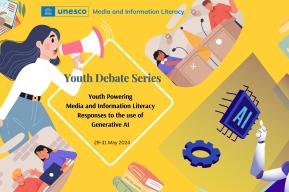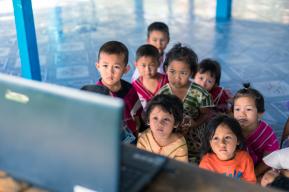Idea
Reimagining South-East Asia's development: Towards inclusion and equity

The UNESCO Multisectoral Regional Office in Bangkok is pleased to present the first in an occasional series of informed advocacy statements by our area specialists. The views expressed here are intended to inform the public of important themes and issues of the day as they relate to UNESCO’s regional mandate in education, the natural and human sciences, culture, and communication and information in Asia and the Pacific. The views expressed here should not be construed as representative of any official policy adopted by the Organization in regard to the subject under discussion.
In 2023, the Social and Human Sciences disciplines are being summoned to help deconstruct the acute crises currently affecting South-East Asia. Such deconstruction work is crucial in planting seeds in the minds of men and women for constructing new narratives, new models of development, and new analytical systems. Together, we can affect major shifts in the way we do development. Indeed, we are in a very substantive moment in the history of this region.

Amidst the ever-shifting landscape of South–East Asia, the Social and Human Sciences (SHS) unit of the UNESCO Multisectoral Regional Office in Bangkok (UNESCO Bangkok) is taking a bold step forward. SHS is calling on all developmental stakeholders in the region—Member State governments and civil society alike—for a comprehensive reshaping of our existing developmental trajectory to ensure that no one is left behind and the people’s quality of life is sustained.
In recent decades, South-East Asia has embarked on a transformative social and economic journey, with current projections still placing the region as the world's fourth-largest economy by 2030. However, there is a concerning ‘shadow side’ to this compelling story: a societal sub-narrative of stubborn inequality and marginalization, indeed one which has only been exacerbated by the COVID-19 pandemic. The rapid economic growth, urbanisation, and infrastructural transformation have also resulted in lasting environmental degradation that affects the quality of life of the people. UNEP estimates that in Asia-Pacific, about 4 billion people (around 92% of the region’s population) are exposed to levels of air pollution that pose a significant risk to their health.
With the myriad challenges of a rapidly growing South-East Asian region apparent, UNESCO suggests we use the knowledge developed by the social and human sciences to critically reflect on what constitutes ‘development’ as we approach the middle of the twenty-first century. And UNESCO Bangkok insists that this is the moment to usher in a new developmental approach that places human actors at its core, making use of the unique tools and knowledge we can leverage from the social and human sciences.
To catalyze this vision, UNESCO Bangkok convened a regional workshop, Reimagining ‘Development’ Models in Asia-Pacific: Making the Social and Human Sciences Count (hereafter ‘Reimagining workshop’), from 22 to 23 June 2023, which was organized as part of UNESCO’s global Management of Social Transformations (MOST) Programme.
The [MOST] Programme cooperates with national authorities, scientific communities and civil society to help UNESCO Member States strengthen the connection between research and policy, and between knowledge and action, in addressing the major challenges of our time. This is key to fostering positive social change towards inclusive and sustainable development.

1. Integration of the Social and Human Sciences into Policy Dialogues
The workshop highlighted the role of the Social and Human Sciences disciplines as unique tools in understanding our complex reality. The MOST Programme should facilitate structured research-policy dialogues that bridge the academic world and decision makers in devising people-centred, participatory, and sustainable development models. Such an approach involves fostering interdisciplinary reflection and collaboration to unpack the major social transformations countries face and to shape policies aligned with the region's needs, including by using foresight and future literacy.
2. Promoting a Culture of Enquiry among the Youth and Transform Learning in a Complex World
South-East Asian nations have elaborated ancestral traditions of enquiry and learning, using what modern education science calls the “cognitive, emotional, and social functions of learning”. Such assets are of great value today in enabling the youth and all individuals to continuously learn to interrogate our greatly complex societies, to anticipate and innovate with new paradigms, and to embrace diversity and differences in building inclusive and peaceful societies. Transforming education indeed requires that our education philosophy fosters a culture of enquiry that encourages the youth in “learning to learn”. To this end, UNESCO shall encourage critical thinking, inquiry, and cultural understanding among students while the region navigates complex societal challenges.
3. Advancing Gender Equality, Disability Rights, and Diversity
Addressing intersectional discrimination will be essential to overcome the entrenched inequality in the region. This is also key in promoting the great diversity of the people that compose the social and culture fabrics of the ASEAN countries. UNESCO shall seek to give voice to the invisible, to advise policies, and to accompany social movements for change, by fostering a culture of Gender Equality, advancing disability rights, and promoting cultural diversity and indigenous cultures and knowledge systems.
4. Ethical Considerations for AI and Climate Change
The workshop underscored the importance of UNESCO's normative frameworks in addressing the ethics of artificial intelligence (AI) and climate change, two areas of particular concern for the ASEAN region. In implementing its 2021 Recommendation on the Ethics of Artificial Intelligence, and in leveraging the 2017 Universal Declaration on Ethical Principles in relation to Climate Change, UNESCO Bangkok aims to support governments in South-East Asia in understanding and addressing the ethical implications of the new and emerging technologies, and of climate change and environmental degradation.
Human and social sciences are dedicated to searching for knowledge and understanding, like a candle with a weak, flickering, but yet warm light in a deep dark cave.
Progress need not focus also on the regional integration in ASEAN. To sow the seeds for a positive societal transformation for South-East Asia driven by the ideals of justice, equity, opportunity for all, and shared prosperity, UNESCO believes youth’s, students’, and scholars’ mobility in the region is essential. Such a mobility should foster the exchanges of experiences, ideas, and common concerns, which will in turn strengthen the sense of regional belonging, plural identities, and shared aspirations among the generations to come.
#SocialTransformation #YouthEmpowerment #EthicsOfAI #EthicsOfScience #SocialInclusion #SocialDiversity
More from UNESCO Bangkok
Share
About the authors

Kim Encel is Consultant at Social and Human Sciences Unit, UNESCO Regional Office in Bangkok. He specializes in designing sustainable sport for development projects which address a variety of societal needs. Kim’s doctoral dissertation was completed at Deakin University (2020) and focuses on the establishment and evolution of a professional women’s football competition in Australia. In addition to his consulting work for the Social and Human Sciences Unit of UNESCO Bangkok, Kim continues to lecture and research in sport management at Deakin University.











